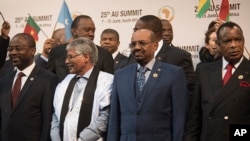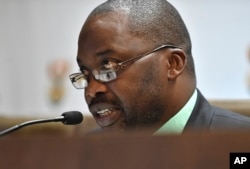South Africa says it plans to withdraw from the International Criminal Court.
Justice and Correctional Services Minister Michael Masutha said Friday a bill will be submitted to parliament recommending that South Africa repeal implementation of the Rome Statute that created the court. The statue obligates its signatories to arrest anyone sought by the ICC.
Analysts fear South Africa's decision could encourage other African nations to abandon the Hague-based tribunal, which prosecutes war crimes and crimes against humanity
Broker of peace
But Masutha defended the decision, citing his nation’s interest in being a broker of peace in Africa.
South Africa can’t provide a safe space for leaders to talk peace, he said, if it is compelled to comply with all the court’s arrest warrants, such as the one for Sudan’s President Omar al-Bashir, who is wanted for war crimes and crimes against humanity.
Bashir visited South Africa in mid-2015 for a summit of the African Union. South African officials declined to arrest him, saying he enjoyed diplomatic immunity.
“In exercising its international relations with foreign countries, particularly with countries in which serious conflicts occur, or have occurred, South Africa is hindered by the implementation of the Rome Statute of the International Criminal Court,” Masutha said. … “This act and the Rome Statute of the International Criminal Court compels South Africa to arrest persons who may enjoy diplomatic immunity under customary international law.”
Masutha says the nation’s cabinet decided this week that its only option was to leave the court and notified the U.N. that South Africa would leave in one year. A U.N. spokesman said Friday that U.N. Secretary-General Ban Ki-moon has received a letter to that effect from South Africa.
Earlier this week, Burundi also said it will leave the ICC, citing concerns that the court targets African leaders. The United Nations recently launched an investigation into Burundi’s political violence, triggered by President Pierre Nkurunziza’s decision to seek a third term.
Politics before justice
Dewa Mavhinga, a senior Africa researcher at Human Rights Watch, says South Africa is putting politics ahead of justice.
“South Africa’s move sends the wrong message that really is about protecting al-Bashir, protecting heads of state from justice and accountability and actually sets a wrong precedent and can have a domino effect on other African states following suit.”
Anton du Plessis, managing director of the Pretoria-based Institute for Security Studies, said he is not concerned about a mass African exodus from the court. He believes many of the court’s member states are not politically organized enough to agree on a withdrawal strategy.
But he says he is worried about the reverberations in South Africa itself. The nation has been battered by political and legal controversies, some sparked by the leadership’s refusal to arrest Bashir in 2015, and this, he says, doesn’t help.
“I think for South Africa it’s a particularly bad move,” du Plessis said, “because of what is going on domestically. The rule of law is under attack at a national level, South Africa’s reputation is in tatters, our ability to play the role a beacon of constitutional democracy is being eroded every day.”
As for the man who started all of this, Bashir has not returned to South Africa since that controversial 2015 trip.
When asked what his nation would do if the Sudanese president were to show up on South African soil, Masutha shrugged and declined to speculate.





